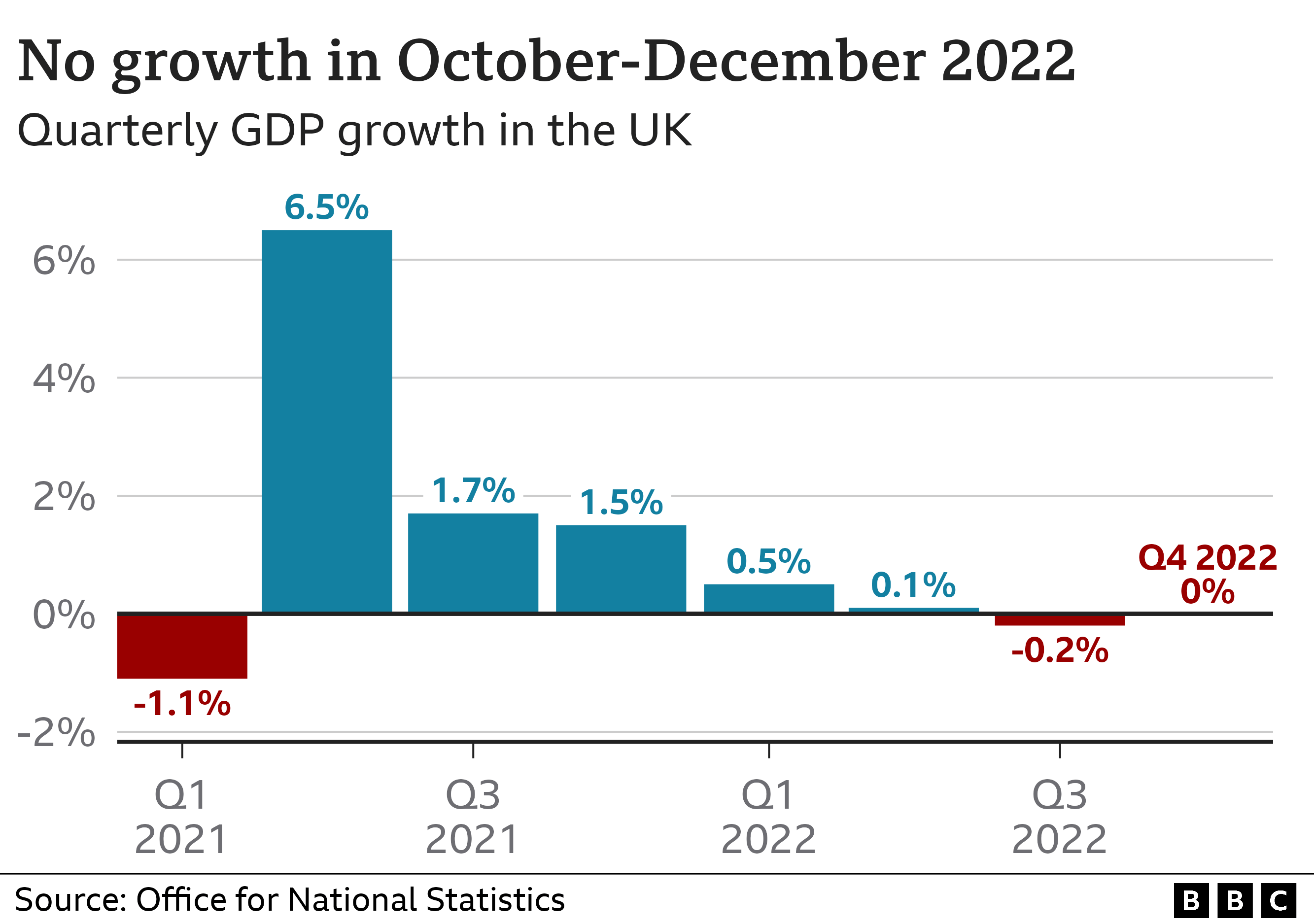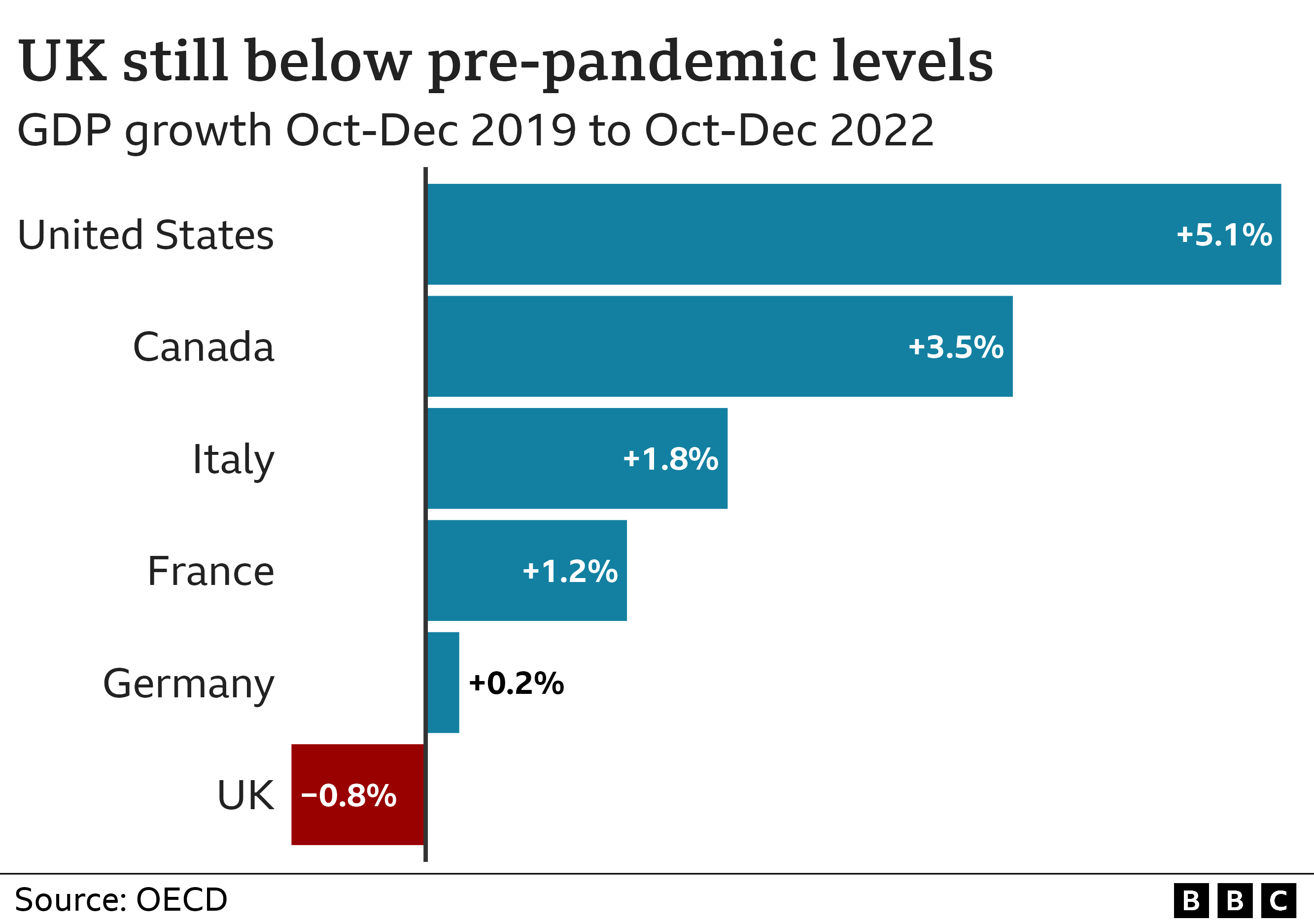The UK narrowly avoided falling into recession in 2022, new figures show, after the economy saw zero growth between October and December.
This is despite a sharp 0.5% fall in economic output during December, partly due to strike action, the Office for National Statistics (ONS) said.
Chancellor Jeremy Hunt said the figures showed “underlying resilience” but said “we are not out of the woods”.
The Bank of England still expects the UK to enter recession this year.
But it thinks it will be shorter and less severe than previously forecast.
The Bank of England is the UK’s central bank. The BBC included its view as it has a central role in managing the overall state of the economy.
One of the ways it does that is by changing interest rates. Recently, it has been raising rates in a bid to tackle the soaring cost of living.
Mr Hunt, who the BBC spoke to for the government’s position, said that high inflation remains a problem and continues to cause “pain for families up and down the country”.
Inflation – or the rate at which prices are rising – is slowing but at 10.5% remains close to a 40-year high.
- What is GDP and how does it affect me?
- What is a recession and how could it affect me?
- Why are prices rising so much?
The ONS, which published the economic output figures, said there was no growth in the final three months of 2022.
This is the first estimate for the period and figures are often revised later on.
On Friday, the ONS revised up its figures for the July to September quarter, to show that the economy shrank by 0.2% instead of the previous estimate of a 0.3% fall.

A recession is typically defined as when the economy shrinks for two consecutive three-month periods. This usually means it is performing badly and companies may make less money and cut jobs, leaving the government with less tax revenue.
The figures for December, however, were worse than expected, and there will be no celebrations at the Treasury.
Darren Morgan from the ONS said there was a fall in health services with fewer operations and GP visits, while school attendance also dropped in the week before schools broke up for Christmas.
He explained that in terms of public services, the ONS measures things like teachers’ wages, and how much investment is made in schools and the health services. “The services they provide are a really important part of the economy so we include it in our measurement,” he said.
He also said that sporting activities, particularly football, were impacted because of the World Cup.
He said people were not “able to enjoy top-flight football due to the absence of Premier League football until Boxing Day, as the World Cup continued”.
Mr Morgan added that rail and postal industries “had a poor month”. “We certainly saw the impact of strikes as both fell heavily in December.”
Strike action on trains caused disruption on the railways and on the roads in December. Postal workers also went on strike on a series of days in the run-up to Christmas.
The year-on-year comparison is not the same as adding up the quarterly growth figures.
It is a comparison of the full year with the full previous 12 months, which in 2021 included the lockdown at the beginning. When compared against that low base, the UK’s economy was 4% bigger in 2022 than in 2021.
That was the biggest increase of all G7 nations for last year.
But the UK is also still the only G7 country where the economy is smaller than pre-pandemic levels.

Labour and the Liberal Democrats, who we’ve included to explain opposing parties’ point of view, warned the latest figures make for grim reading.
Rachel Reeves, Labour’s shadow chancellor, said they show the economy “is stuck in the slow lane”.
She added: “We must bring in urgent measures to prevent yet more harm from the cost of living crisis, using a proper windfall tax on oil and gas giants to stop the energy price cap going up in April so that people have more money in their pockets.”
Liberal Democrat MP Sarah Olney said: “Britain is dangling on over the edge of a recession after months of economic vandalism and chaos in government.
“The blame for these gloomy figures lies squarely with the government, who have botched budgets, failed to tackle inflation and have no plan for growth.”
